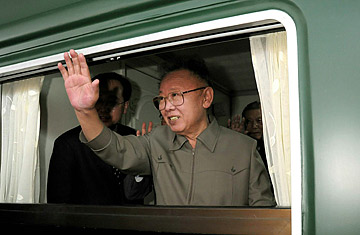
In this handout from North Korea's Central News Agency, Leader Kim Jong-Il waves from a train leaving China's capital on May 7, 2010.
The international man of mystery boarded the midnight train from Pyongyang, headed (for reasons known only to him and his unforthcoming hosts) to China. It's the only foreign country North Korean leader Kim Jong Il ever travels to, and, up until now at least, only infrequently. (He's made six trips to China since becoming leader in 1995.) China always plays along with the weirdness that is Kim Jong Il and North Korea. When any other head of state visits the country, there is the routine fanfare that goes along with it: a greeting at the airport, the strut in front of the honor guard, meetings with senior officials, snippets of which are usually shown on CCTV, China's state owned broadcast propaganda organ.
But when Beijing's favorite little dictator comes, it's all secrets and lies: the Foreign Ministry neither confirms nor denies that Great One has come — until he's gone. A lone report on a Chinese internet site quotes "foreign media" as saying the Dear leader has arrived, but the Foreign Ministry declines comment. No one knows whether he's en route to Beijing or not. No one knows whether his third son, Kim Jong Un — who, having apparently drawn the short straw, is reputed to be the Dear Leader's successor — is with him or not. How many days will he be in country? Did he meet in the northeastern city of Changchun with Chinese President Hu Jintao (as one South Korean television network reported)? What's he doing here?
God forbid the spokespeople in Beijing give you a hint. That China, allegedly the second most powerful country on earth, plays along with this is an embarrassment. One decade into the 21st century, they go along with juvenile, Cold War-era games that at this point are beyond parody.
And this time, the questions about the Little Man's trip were more numerous than usual. He got out of Pyongyang just hours after none other than Jimmy Carter had arrived on the latest Washington-Pyongyang shuttle service run by former U.S. Presidents. It specializes in retrieving wayward Americans who somehow manage to find themselves in jail in North Korea; the last mission was flown by Bill Clinton one year ago. He brought back two naive American television journalists, who had been set up by their fixer in northeastern China and led across the border into the waiting arms of North Korean border guards. (Next thing you knew, Kim Jong Il was beaming ear to ear in a photo op with a grim looking Clinton.)
Not this time, though. For whatever reason, Kim got out of Dodge apparently before having to sit down with President Carter. The North Koreans obligingly handed over Aijalon Mahli Gomes, a 31-year-old described as an English teacher and human rights activist, who walked across the Chinese border a month after yet another American "activist," Christian missionary Robert Park, had done the same thing. (Carter collected Gomes and was headed back on Friday. Park was released six weeks after his arrest.)
The timing of Kim's trip across the border was curious for other reasons as well. His previous visit to China was last May: why the need for another just four months later? As of the end of the day Friday in China, the only thing we know for sure was that Kim visited a school in Jilin province that his father attended from 1927 to 1930. Some North Korea watchers speculated that this might have been an attempt — plainly with China's blessing — to solidify the family's dynastic claim to North Korean leadership. In two weeks, at a key party meeting in Pyongyang, Kim is expected to elevate his son to a position in the Korean Workers Party that will be a steppingstone to taking over as at least the titular dictator in 2012. But if that's true, why wouldn't the presence of Jong-un, 28, be more obvious while visiting his grandfather's school?
Others speculated that the trip might have something to do with what appears to be China's renewed interest in ginning up yet another round of the long stalled "six-party talks," which were intended to halt North Korea's nuclear weapons program in return for economic and diplomatic bribes from the U.S., Japan, and South Korea. So far they have failed. But just last week Wu Dawei, Beijing's chief nuclear negotiator, was in Pyongyang, and then headed to Seoul and Tokyo for further discussions. Is it likely Kim boarded the train to talk even more about nukes with Beijing, despite the fact Wu was just in North Korea?
Another possibility is that Kim may have the beggar's cup out if, in fact, he meets China's top leadership, according to Cheong Seong-chang, a senior fellow at the Sejong Institute, a think tank in Seoul. Cheong just returned from a two-week trip to China during which he tried to dope out the current state of Pyongyang's relationship with Beijing. Floods have devastated portions of North Korea this summer, which is going to hurt the country's already fragile food supply. Cheong says North Korea may be upset that China isn't living up to a side agreement to the Beijing-Pyongyang friendship treaty; it calls for China to deliver up one million tons of oil per year to North Korea, but sources told Cheong on his recent trip that those shipments have been cut in half.
That, if true, would be business as usual for North Korea — a country that, without China's assistance, would be a failed state. Which is precisely why China pays up — just enough to keep Kim Jong-il parading around in his sunglasses on his official state visits to China that no one can admit to, and just enough, apparently, to ensure that Kim's son will get to carry on the family act in two years' time.
